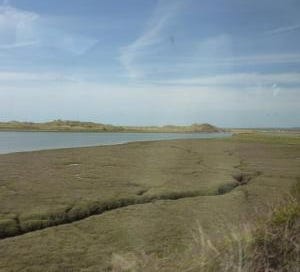Northern Rail Odyssey part 1: The West Cumbrian Coast
Most of the way from Carnforth to Maryport, the train line is never far from water. At the southern end, around Arnside and Grange-over-sands it's all flat fractured fields, land and sea tangled together with grassy spits, and muddy fingers of water encroaching in each other's element. Further up, there are wild rocks, crashing waves, and rows of regimented black seabirds that I'm fairly sure are cormorants. There are pebbled beaches, harbours and marinas, working coast, leisure coast, deserted coast. I could spend days travelling up and down that line in rain, sun and mist to see how different it looks. I may, someday.
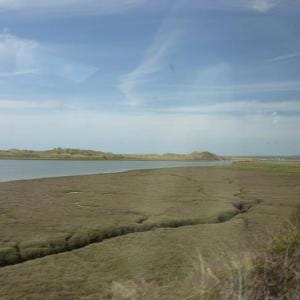
Between Carnforth and Ravenglass
This time, however, we stopped off at Ravenglass, where 3 rivers drain into the sea and the MOD does artillery tests (don't go on the beach when the red flag's flying...). It's famous for its narrow-gauge railway, which used to carry ore to the sea and now carries walkers, rail enthusiasts and excited children the seven miles between Ravenglass and Boot. OneMonkey was bemused by my eagerness to venture on a small steam train with proportionate carriages, but while I wouldn't say he was converted by the time we'd been to the other end of the Ravenglass and Eskdale railway, he did concede that it was a nice way to see the countryside. You clatter through woodland, past sheep, cows and pheasants, and unfold yourself from the miniature carriage into one of the most peaceful and picturesque valleys I've ever seen. Being hemmed in by the towering fells, then returning to the wide, flat estuary at Ravenglass is quite a contrast. We couldn't spend long in Eskdale, however, as the nature of a whistlestop tour is that you don't have long anywhere, just enough to form an impression, soak up some vibes, and leg it back to a station.
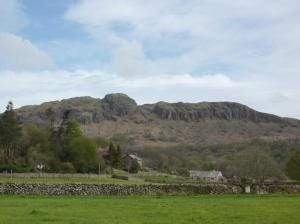
Walking towards Boot from Dalegarth station
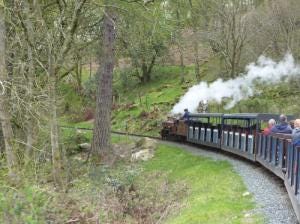
Ravenglass and Eskdale railway
One thing I hadn't come across in a while, which featured on both the steam railway and the main line, was request stops. Because our tickets didn't specify a destination, every time we boarded a train on the coast line and showed our tickets, the conductor asked where we were heading, and as it happened we only used the scheduled stations. It made me wonder how request stops work the other way (when you're on the platform and want the train to pick you up). Do you stick your hand out as though it was a bus (how long does it take a train to brake to a halt)? Or is there some more sophisticated system involving the signalman's phone? I never asked, in case of mundanity - I prefer to picture walkers on remote platforms hopping up and down waving scarves like demented football fans, desperate not to be left for the night.
On any jaunt that doesn't qualify as a city-break there is the perennial problem of where does a vegetarian eat in this small town/even smaller village. There are three home-made varieties of Cumberland sausage, lamb this, beef that. All very traditional and fitting to the surroundings, but the death of a pet lamb thirty years ago (marauding badger) turned me off the idea of eating sheep, and gradually I relinquished as food all the remaining animals I ate but was fond of(by which I mean pigs and cows, in that order. Chickens, vile, vicious pecking creatures, I still ate occasionally for a further ten years). I would always prefer to eat in a country pub or independent cafe (I was genuinely disappointed to notice Wetherspoons, Costa, Subway in Whitehaven) but they don't always want to encourage me. It was a delightful surprise to find the Ratty Arms at Ravenglass (right on the railway platform, though no trains went past while we were eating) had an actual selection of vegetarian meals. Cue crippling indecision, naturally, but when I did make up my mind I had a most enjoyable dinner (shame about the beer - where's a Jennings pub when you want one?).
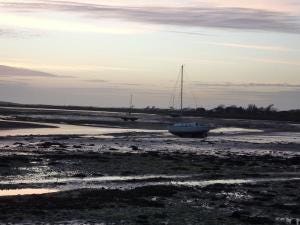
On the beach at Ravenglass
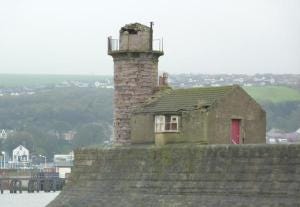
Whitehaven harbour
As a complete contrast to the tiny laid-back estuary-nestling village of Ravenglass, the following morning we chugged up the coast to Whitehaven. OneMonkey was looking through the opposite window, and missed the blot on the landscape that is Sellafield - if you do that, simply turn your back on it, you can remain immersed in coastal beauty and you need never know it's there. There's a definite inkling as you push north on the coastal line that this is Cumbria, not the Lake District - a little less loved, a little less visited (though clearly we were visiting, and I have loved these places since childhood). Whitehaven, from one angle, is a colourful Georgian port with a busy harbour and bustling shops. From another, it's one more northern town that got left behind, faded grandeur fronted with bingo halls, and a boarded-up art deco bus station. I hadn't been to Whitehaven for at least eighteen years and I was disappointed not to recognise anything much, whereas every time I go to Carlisle (not very often, and it's a place I've visited much less than Whitehaven) there's a certain corner I turn and get hit with overlayed locational memories of a whole stack of years at once. Then we walked near the multi-storey car park just as a gull screeched nearby, and I could feel the smooth bricks on the car park stairwell and my dad's huge hand around mine, and I was peppered with childhood memories. Thinking about it, I do associate the sound of the seabirds with Whitehaven, more than anywhere else - having visited a few other coastal towns and villages on this trip, they do all sound (and smell) different.
Finally, a quick stop in Maryport, where the rain that was a nuisance in Whitehaven became a stinging impenetrable curtain, and we abandoned all plans. If Whitehaven got left behind, what can you say about Maryport? It has the longest row of independent shops I've seen in years, and has barely changed since my last visit (again, at least eighteen years ago) but I'm not sure everyone would see that as a good thing. It mostly felt empty, though that could just have been the rain, the only signs of life a huddled figure leaping from the chip shop to a waiting car.

